Heather Nogrady introduced Garret Cole, Rotaract chair of Rotary in Kingston and one of the youngest Rotarians (RC Kingston) in Kingston, and a member of Toastmasters. He drives an Audi and loves dogs.
For the past 2 years Garrett has been co-chair for Rotaract, Interact, and Earlyact and the liaison between the Rotary Club of Kingston and the Queen’s Rotaract Club. He spoke about Rotaract in Kingston and beyond.
He began with two examples of recent Rotaract service activity:
Pi(e) Day - selling delicious, well, sometimes delicious, mostly passable and never poisonous pies. Last time they were actually rather good; a volunteer from the Boys and Girls club whose facilities they were using headed up the baking.
Rotaract - Purple Pinky Day. The good news is that the dye isn’t carcinogenic anymore!
He then spoke of the history of Rotaract, what it is around the world, and how it is changing with recent changes to the Rotary International constitution and bylaws. Rotaract is a service, leadership, professional and community service organization (often colloquially called a Social Service Club). Rotaract is often described as being like Rotary, but with better parties. It was formed to give young adults who were not ready for full Rotary membership a place to connect and take action for good. Rotaractors are true independent partners in service.
Rotaract History
As early as 1935, Paul Harris encountered a youth organization based on Rotary principles in Australia. In the 1950's many youth clubs were sponsored by Rotary clubs under various names. In 1962 the Interact program for school age children was started and by the mid-1960s, Interactors, having reached the age limit of that program, were starting new types of clubs called “Senior Interact.” Very soon an official version for young adults was started. Rotaract originally began as a Rotary International youth program in 1968 at Charlotte North Rotary Club in Charlotte, North Carolina. The new program’s name, Rotaract, was created by Rotary International as a combination of the words “Rotary” and “Action.” We celebrate World Rotaract Day the week of March 13 every year to commemorate the founding of the first Rotaract.
History in Kingston
The first Rotaract club in our Rotary district started here in Kingston in 1979 as a community-based Rotaract club. It provided good team-building experiences and leadership, social connections and community service projects; however, this is a very mobile age group, frequently changing jobs and locations. In the days before social media, they were a difficult demographic to reach. In 1983, it folded. In 1993, Rotaract got a new start, based at Queen’s University. With a fresh cohort starting every year, recruiting was easier. But the downside was that, in four years (or fewer), these students left Rotaract. The club has been very active and very creative over the years. Just this spring we founded the Kingston Community Rotaract Club with recent Queen’s Rotaract alumni. A global pandemic is perhaps not the best time to start a new club, but it’s what we’ve got and we’re excited about the people involved and what they will be able to accomplish.
For many of us in Rotary, service often means just writing a cheque. The Rotaractors can’t do that, they’re student-poor. They’re also usually car-less, which means that they can’t do some of the legwork that most Rotarians can do. But what they can contribute is time and effort. Rotaract co-president Caleb calls it Sweat Equity, and they have an abundance of that. Most importantly, they bring new ideas and approaches and tremendous energy and enthusiasm to Rotary projects and events.
Rotaract Does - Easter Seals
Rotaract contributes heavily to our efforts to improve the quality of life of children with disabilities. Here we see recent co-presidents Hanna and Sari with an Easter Seals representative on the Global news.
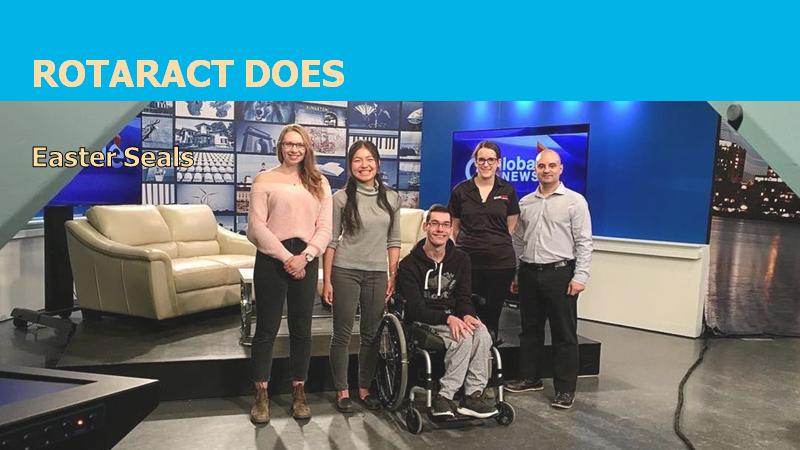
Rotaract Does - Pi Day
It’s a big effort to bake that many pies. Here we see the club baking away at the Rideau Heights Community Centre, which was one of Garret's first outings in his tenure in his role with the club.
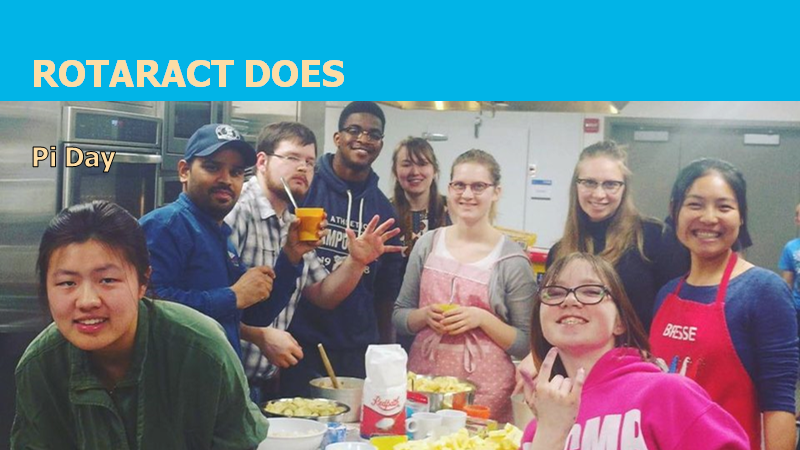
Rotaract Does - Euchre Tournament Fundraisers
This is a very popular form of fundraiser. Darlene is always asking when the next Euchre tournament is going to be. Garrett missed the last two due to scheduling conflicts but is itching to get to one whenever it's possible to start having them again.
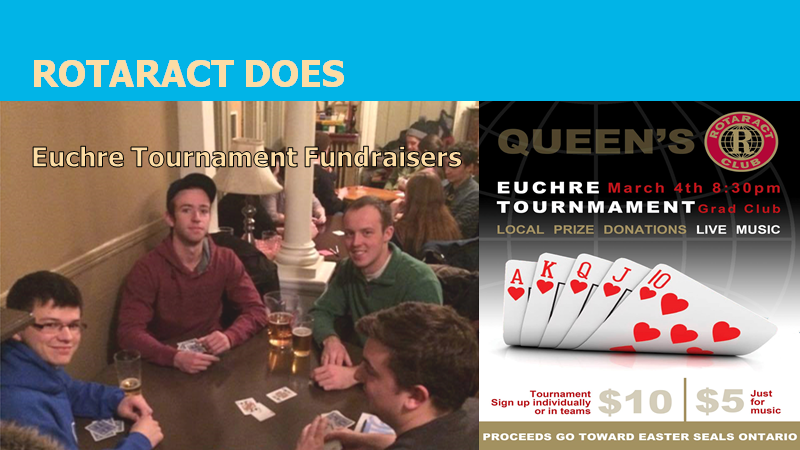
Rotaract Does - Purple Pinky Day
Purple Pinky Day is an awareness and fundraising campaign for polio. It represents the purple mark on the fingertip of the pinky given when vaccinating a child by mouth so that the health care workers can keep track of who has been vaccinated. Every year Rotaract sets up a stall for Purple Pinky Day. Ellen looks like she’s gotten 10 vaccinations, which is really too many. You’re only supposed to get one so this is a gross mismanagement of vital resources.
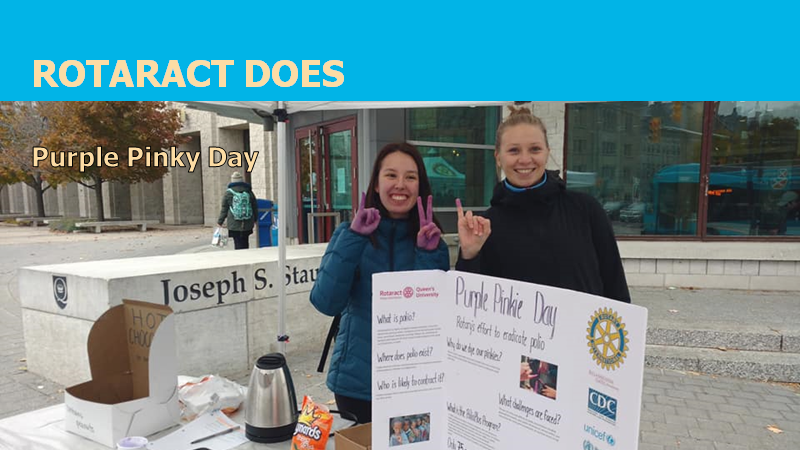
Rotaract Does - Halloween for Hunger
Around this time of year Rotaractors connect with the community and go door to door to collect non-perishable food donations for the food bank, obviously not on actual Halloween though because that would be confusing and result in a very non-nutritious diet for the program recipients.
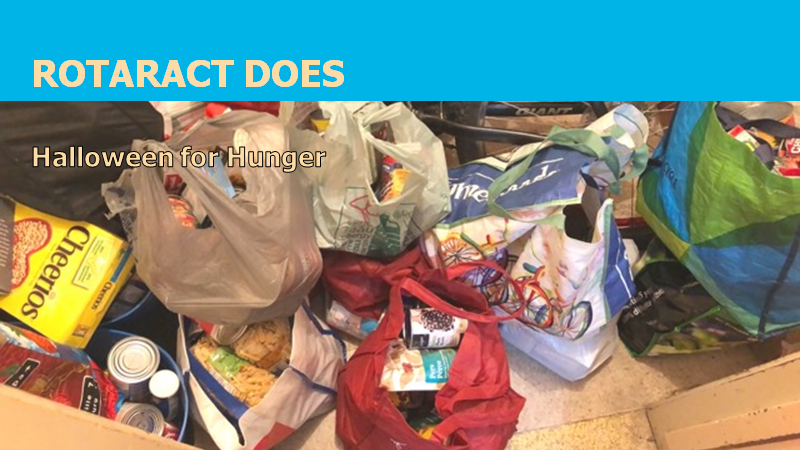
Rotaract Does - Change Drive for Isthmus
That’s Paul Elsley’s food charity. They did something interesting this year, if you can read the labels on the plastic bins, they separated the donations into the different faculties to turn it into a contest, which is great for getting the competitive fires burning. The Rotaractors are also helping to pack the food boxes every week, which is a huge undertaking.
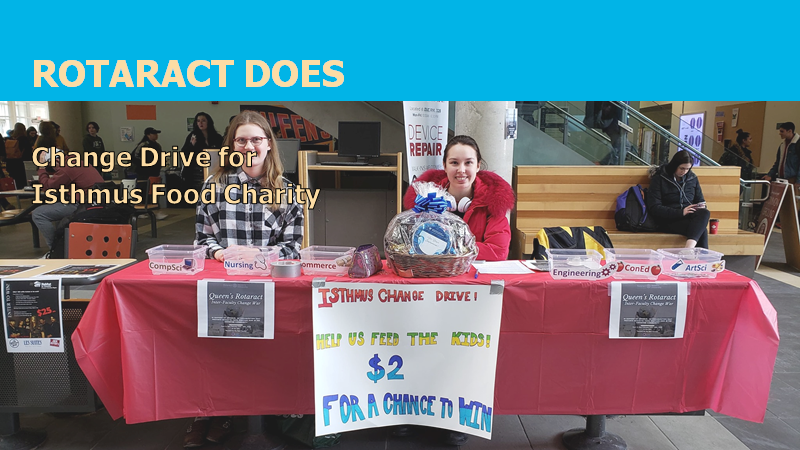
Rotaract Does - Hygiene Drive
Rotaractors have set up booths at drug stores to collect personal hygiene items for the Kingston Youth Shelter
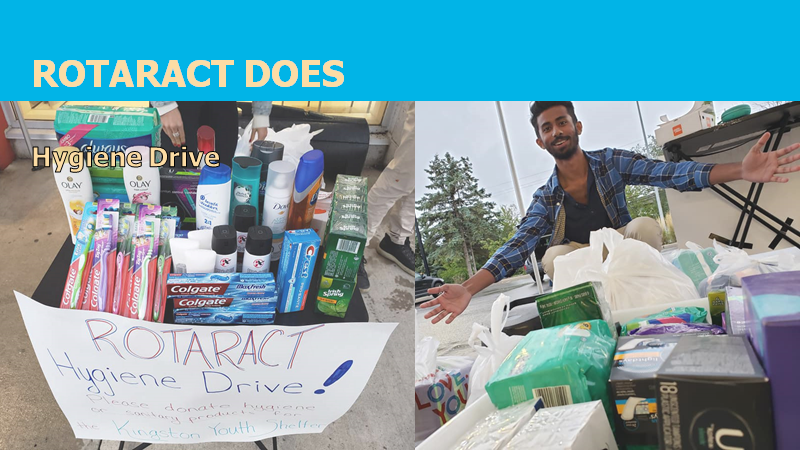
Rotarct Does - Tree of Hope
This is a fun charity drive where the Rotaractors get into the holiday spirit collecting toys for underprivileged families.
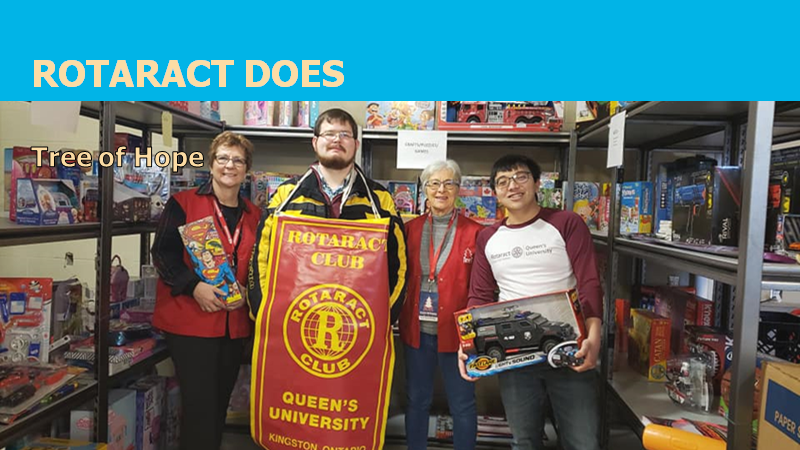
Rotaract Does - Service Trips: El Salvador
Here is something that likely won’t be starting up again any time soon for obvious reasons. For several years Queen’s Rotaract went to El Salvador to help build homes and teach children.
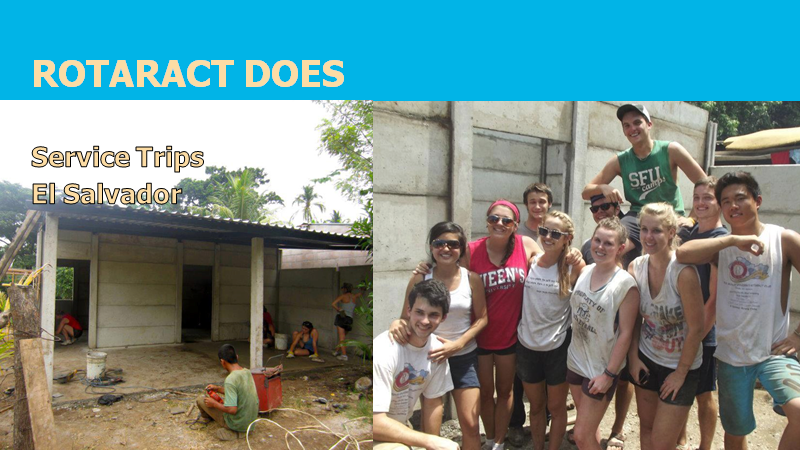
KI First Nation
In 2014 they visited Kitchenuhmaykoosib Inninuwug (KI) First Nation community in Northern Ontario. They raised funds to support the costs of flights, food, accommodation, and the like. They also got to build a connection with both community members and students, and led educational workshops.
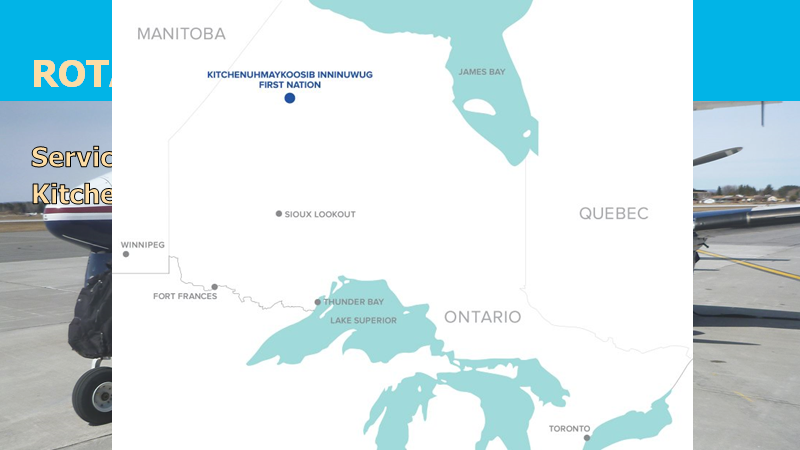
Rotaract Does - Nut Drive
Rotaract participates in a big way for our Nut Drive. While they lack the cars needed to drive the Engineering frosh on their routes, the day requires a large number of volunteers in the marshalling area. This photo does not have any Rotaractors but is notable because it is last year’s district governor Martha Weaver with what are likely the 8 cleanest Engineering frosh they could find.
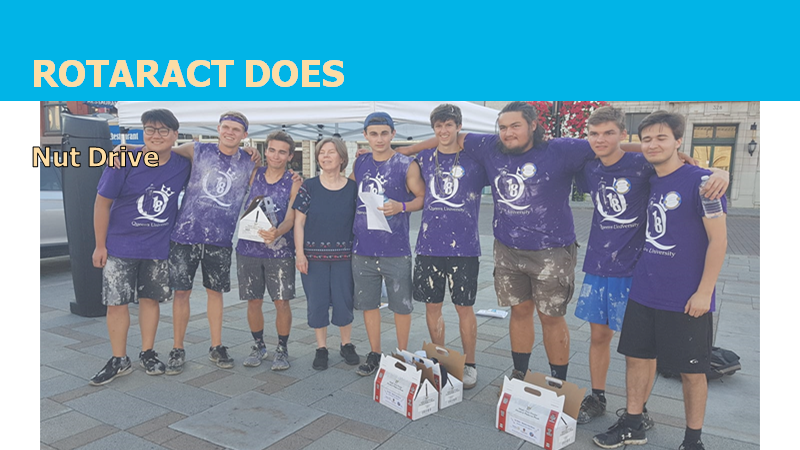
Statistics
Rotary International changes to Rotaract in 2019-2020
Currently, there are 203,298 Rotaractors, my that’s a specific number, we keep good records don’t we? That represents about 12% of the Rotary Family. Clubs number 10,698, some based in universities and, increasingly, many based in the community. Rotaractors tend to range in age from 17 to 36.
Unfortunately, 90% of Rotaractors do not go on to join traditional Rotary clubs, which has been a big problem and one we’ve been trying to fix both locally and globally. To that end, this year, the Rotary International constitution and bylaws were changed with regard to Rotaract resulting in many important changes that they hope will empower Rotaractors and help to retain them through to full Rotary participation.
Originally, Rotaractors were considered Rotary Program participants. Now Rotaractors are considered as their own type of membership elevating its status to resemble that of Rotary clubs. Rotaract clubs used to have to be sponsored by a Rotary Club but as of 1 July 2020, Rotaract clubs can exist on their own if they so choose or even sponsor other Rotaract clubs. The age limit was 31, but now the upper limit has been removed, though individual clubs can set an age limit if they wish. They’re now eligible to serve on Rotary committees. Rotaractors will soon have to start paying dues to RI but the level hasn’t been decided yet, but will be very low. With more flexible RI rules regarding membership, Rotaract clubs now be on an equal footing with Rotary clubs. Through dual membership, lower fees, and different structures and approaches, RI is hoping to keep these young professionals interested in and engaged in serving our communities until they’re on a more secure footing to join Rotary proper.
Challenges
Like many service clubs, Rotaract is facing a shrinking membership worldwide. Participation has dropped from 250,000 members and 10,904 clubs last year. University students are facing pressures from competing interests, increasing demands on their time and attention, and economic challenges. And hanging over us all is the worldwide coronavirus pandemic which has put a damper on many of the in-person efforts we would normally be making.
How to help
We are trying to work together for a closer partnership. Up until recently we’ve been operating at arm’s length from Rotaract and we’d like to be more integrated. We have been trying to get more Rotaractors on our committees. We currently have two and would like more. While it’s a bit difficult right now due to COVID-19, we were taking efforts to have more joint fellowship events with Rotaract and getting more of their members out to our weekly club meetings when possible. Rotary clubs can support Rotaract by promoting membership with young persons they know, through the workplace, community groups, neighbours, and their own families. When things get back to normal, they’d love to welcome your involvement in more of their events and vice versa.
Currently Rotaract has 18 members, 10 of whom are in Kingston right now. In online meetings, typically 6-12 come, similar to real-life meetings last year.
Discussion
Michelle: part of kitchen crew in 2019. Engagement with after-school program. BGC, lots of fun. Great example of collaboration.
John G: What’s the status of the Community club?
Garrett: It started meeting late in the spring, still working on paper work, somewhat delayed due to COVID, working on building up membership. Trevor Dagilis is the liaison.
Joyce Yee: An dea--so many people are intimidated by computers, and are incredibly lonely; it would be good to set up a seniors program to help set up for Zoom, and to do anything on a computer.
Paul van Nest:The Interact club at Frontenac Secondary School did that, going in pairs to seniors for lessons, but now they can't with COVID-19.
Rick Frasso presented a virtual loaf of bread and thanked Garrett and encouraged us to join Rotaract’s Facebook, Instagram, and Twitter.

